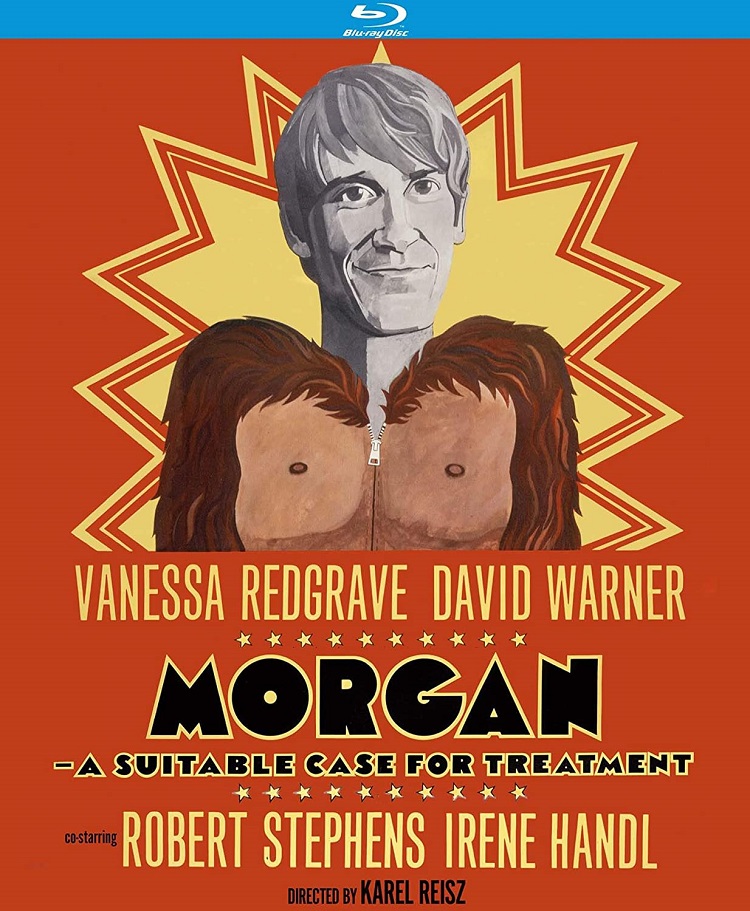
Morgan is going mad. Or maybe he was always a little mad, but it became too much and wasn’t as fun as it was when they were young. Either way, his wife Leonie is divorcing him. Morgan knows this, he’d promised to stay away in Greece until it was all done, but instead he comes back in an attempt to reconcile.
His first salvo to get his wife back is to hide a skeleton in her bed and to skulk around her house, where he is no longer wanted. As this doesn’t work, he escalates his campaign by going after her fiancé with a series of weapons, hanging outside her house in a car covered with portraits of communist leaders, and by eventually hiding a bomb under her bed. It’s all for love.
Morgan: A Suitable Case for Treatment is a 1966 British film that seems to be in the tradition of comedies that propose that people with mental illnesses might have something to teach us, if we could just learn to see things from their point of view. That there might be a special kind of wisdom found in those people that society has deemed mad. It’s a romantic notion, and a kind of literary self-justification for artists getting to act like jerks.
And while Morgan is all about the titular Morgan trying to win back his love, there’s not a lot about the film that could be called romantic. Morgan is a very trying character. He’s an artist who never seems to create any art, and he spends most of his time, when not stalking Leonie in her house despite a court order to stay away, obsessing over animals or communism.
The only two women in his life whose opinions Morgan gives a damn about are Leonie, his semi-ex-wife, and his mother. She’s an old communist who has despaired of Morgan, who despite paying lip service to her cause went off and married a rich girl. Leonie does not seem to be all that well off in the head herself. On the day she divorces Morgan, she takes a bath in front of him. Later, when he fends off her fiancé with a club, she takes him back into her bed. She seems to thrive off of Morgan’s eccentricity and strangeness just as much as she fears it, and encourages him in one breath and shoves him away in the next.
Leonie was played by Vanessa Redgrave in a performance that garnered an Oscar nomination. Morgan is a rare lead role for David Warner. Best known perhaps for playing heavies in the ’80s and ’90s (I have a particular affection for his multiple roles in Tron) as Morgan he has a much different sensibility and physicality than in most of his later roles. It is, indeed, a very physical performance, centered on Morgan’s obsession with animals, in particular the gorilla. The film credits take place over Morgan’s observation of a gorilla in a cage. Later, he tells Leonie that it was a visit to his psychiatrist. The psychology of the gorilla plays heavily into Morgan’s own approach: physically imposing, intimidating, but not generally actually very dangerous.
Morgan’s antics in attempting to win over Leonie barely rise about the level of pranks. When he does visit her fiancé Charles with a gun, a knuckle-duster, and a switchblade, he’s disarmed without any fuss, or really any argument. Morgan’s entire life seems to be about gestures and show, as if they should somehow manifest the reality he seems to desire, but doesn’t ever fully grasp.
In the ’60s, British cinema was working wildly (and only occasionally successfully) to be forward-thinking and hip, and so Morgan is stylistically gestural as well. There are several freeze frames mid-scene, often focusing on Morgan’s face. There are also scenes of sped-up action interspersed throughout the comic scenes; both effects have aged pretty poorly, which is a shame since the film’s black and white cinematography is uniformly gorgeous, and looks absolutely flawless on this Blu-ray release.
While it has the trappings of a wacky comedy (and yes, at some point Morgan does don a gorilla suit and go ape), Morgan is not a laugh-a-minute romp. There’s a kind of tension to Morgan’s interactions with others, where you can’t be entirely sure if he’s going to take that step away from off-putting goofiness into something more serious, maybe even really violent. That and his fantasy that he is, in some way, like Trotsky in exile just waiting for assassins to come and get him for being a traitor to the Communist cause, put a morbid spin on the comic goings-on. And, like any comedy, some of it just falls flat.
But there are two or three comic set pieces that are laugh-out-loud hilarious, and the final comic climax builds on itself beautifully until it culminates (entirely logically) in a man in an ape suit flying down the highways on a stolen motorbike while on fire. There’s a growing sense of surrealism, too, as Morgan’s reality becomes more and more subsumed by his fantasies, again adding a melancholy tinge of actual mental deterioration to the “madcap” comedy.
Morgan: A Suitable Case for Treatment is an ambitious comedy but it is also an old comedy, and that might mean an uphill battle for the viewer. It’s a slow burn (and just an overall slow film) that has to really envelop you in the growing madness of Morgan’s world before it can begin to be truly comic. Some of the dated filmmaking techniques can also throw the viewer right out of the experience. However, given patience, Morgan‘s tragicomic story of love for a woman who might not be worth it is at turns sad, hilarious, laced with pathos and always, always bizarre.
Morgan: A Suitable Case for Treatment has been released on Blu-ray by Kino Lorber Studio Classics. Included on the disc is a dense, informative commentary track by Bryan Reesman, and some trailers for the film.